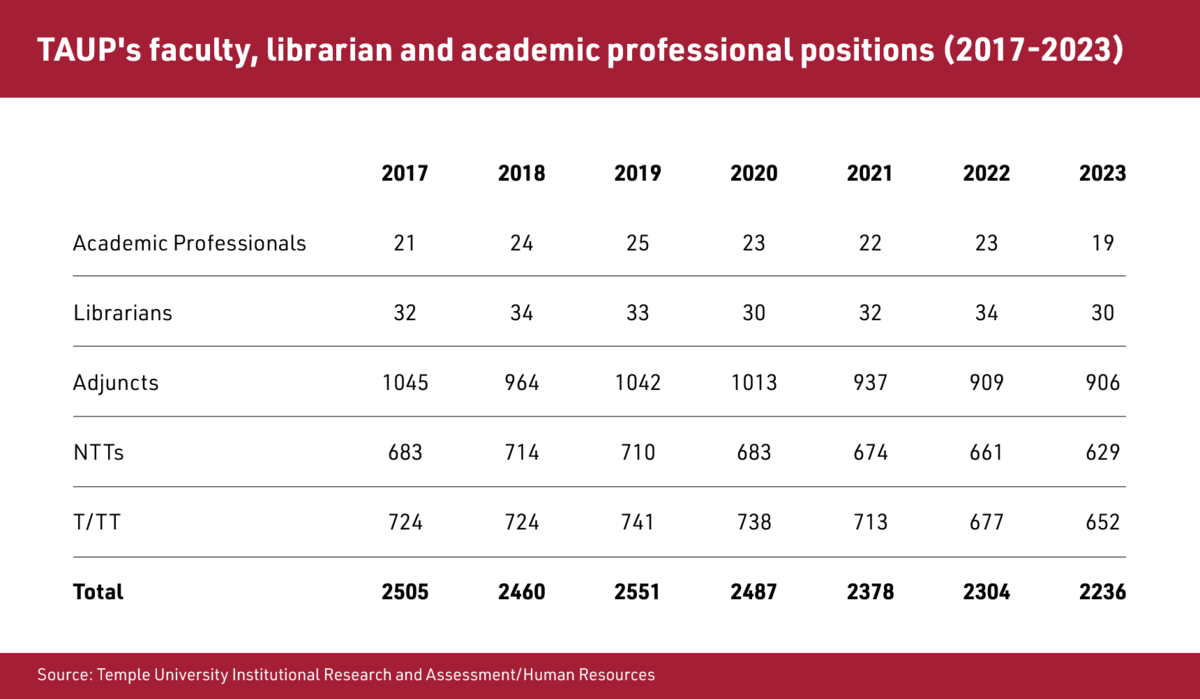Temple presents latest counterproposal to TAUP
After meeting four times since March 18, the university presented TAUP with a counterproposal at the April 10 bargaining session. The new counterproposal works to address items that have been identified as key priorities for TAUP.

On April 10, negotiations continued between Temple University and the Temple Association of University Professionals (TAUP), the union that represents full- and part-time faculty members, librarians, and academic professionals at 13 of Temple’s 17 schools and colleges. In response to the economic proposal TAUP presented on April 2, university representatives used this week’s session to present a full economic counterproposal that proposes increases in benefits and in compensation.
Temple presented a wage and benefits proposal to TAUP during the Feb. 26 bargaining session, and the union responded with a counterproposal. The university has been carefully evaluating TAUP’s counterproposal alongside the union’s priorities to create responsive and meaningful counterproposals. TAUP’s counterproposal made it clear that bringing faculty salaries closer together is important to the bargaining unit, and the university took that into consideration in preparing its latest proposal.
“We have had several productive meetings over the last month as we met four times from late March through yesterday,” said Sharon Boyle, vice president for human resources. “The university’s proposal acknowledges the union’s desire to increase the salaries of lower paid employees at a higher rate, and it is also indicative of the university’s belief that it is time to reward the hardworking faculty and staff members represented by TAUP. The union’s members have not had a raise since July 2022, and this is an opportunity to push to get retroactive pay into the hands of our employees who are represented by the bargaining unit.”
Highlights from the university’s latest counterproposal include the following.
Compensation Increases
- Retroactive to July 1, 2023, full-time bargaining unit employees will receive either a 4% or $3,750 raise, the larger number of the two. In addition, there will be an additional 1% merit pool; and then 2% across the board raises with an additional 1% merit pool in each of the next four years.
- Retroactive to the fall 2023 semester, the per-credit minimum for adjunct faculty will be increased by 19% from $1,550 to $1,850, putting it well above the average Philadelphia rate of $1,600 per credit. Adjuncts in the bargaining unit as of fall 2023 and/or spring 2024 who earned above the minimum will receive a one-time payment of $450, and the adjunct per-credit minimum will increase by $50 per year beginning fall 2024 semester.
- Increases to salary minima across all employee categories, ranging from 12% to 72%.
Job Security
- Severance pay for long-term non-tenure-track (NTT) faculty who are not renewed
- Payment to adjuncts for late cancellation of classes will be increased from 4% to 10%.
Benefit Increases
- The university retirement contribution for NTT faculty will be increased to 8.5%, providing equity between NTT and tenured/tenure-track faculty.
- Addition of prescription coverage for adjunct faculty
- Paid parental leave for librarians and academic professionals
- Increase in short-term disability benefit from $225/week to $350/week, or the opportunity to enroll in another university plan that provides 60% of pay
The university’s latest counterproposal is conditioned upon ratification by May 15, 2024, and if ratification occurs, this collective bargaining agreement will remain in effect through June 30, 2028.
Temple's proposal has also been informed by other recent collective bargaining agreements reached at nearby peer institutions (Rutgers University, Pennsylvania's State System of Higher Education).
“Our goal with negotiations has always been to provide fair conditions and compensation for faculty, librarians and academic professionals while also being responsible stewards of the university’s resources. Access has always been core to Temple’s mission, so we need to ensure that we keep a Temple education affordable for students,” said Ken Kaiser, senior vice president and chief operating officer.
Correcting Misinformation
Over the last week, several news outlets have reported on the university’s negotiations with TAUP. In some instances, those stories have referenced an inaccurate number regarding the decline of Temple’s faculty members from 2017 to 2023. While there have been claims that this number came from university-supplied data, this is incorrect. The university has, at all times, provided the union with accurate data that is identical to the chart below.
This chart has been verified by the university’s Data Verification Unit, and it details how the number of faculty, librarians and academic professionals represented by TAUP has changed from 2017 when Temple’s enrollment was at its peak (40,240) compared to the present day (30,530).

As the chart shows, Temple has managed to limit the changes in faculty, librarian and academic professional positions to far less when compared to the overall enrollment decline. The chart also indicates that tenure and tenure-track faculty within TAUP are down less than 10% from 2017. NTT faculty are down about 8%.
TAUP’s previous collective bargaining agreement with the university expired on Oct. 15, 2023. The two parties have been negotiating toward a new agreement since Aug. 18, 2023.
TAUP and the university will meet next on Tuesday, April 16, and Wednesday, May 1. The two parties are also working to schedule additional meetings for May.
“We are really pleased with some of the recent progress that we have seen during our negotiating sessions,” Boyle said. “Now that we have had several sessions centered around economic issues and healthcare benefits, we can work to find common ground which will ultimately bring us closer to an agreement. We remain confident that we will land on a contract that is amenable to all parties.”
Visit temple.edu/taup-negotiations to view updates regarding the negotiation process.


